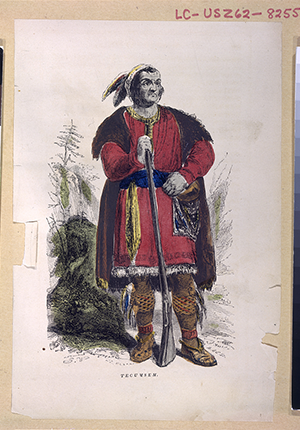Historic Document
Speech at Vincennes (1810)
Tecumseh | 1810

Library of Congress, Prints and Photographs Division
Summary
Tecumseh, a Shawnee leader who was born about 1768, is best known for organizing a confederation of Native nations to combat the settlers flooding into native lands following the Treaty of Fort Wayne, an 1809 agreement made with some nations in Indiana territory, requiring the sale of three million acres to the United States government. In a speech to the territorial governor, William Henry Harrison, Tecumseh challenged the treaty, arguing that it was impossible for individual groups to agree to land sales, because the land belonged to Native people collectively. More was at stake than title to the land. Tecumseh was questioning the basic presumption that underlay not just the Treaty of Fort Wayne, but also the U.S. Constitution and all federal policy relating to land and Native people more generally: that the United States exercised sovereignty over all the land within the territorial boundaries it claimed and would incorporate that land as states. William Henry Harrison and other federal agents did not just want title to Native lands; they also wanted to dismantle the territorial basis for Native nations’ claims to a separate existence within the boundaries of the United States. There are many versions of this speech, which was delivered orally; this summary comes from the records of Governor William Henry Harrison.
Selected by

Laura F. Edwards
Class of 1921 Bicentennial Professor in the History of American Law and Liberty, and Professor of History at Princeton University

Kurt Lash
E. Claiborne Robins Distinguished Professor of Law at the University of Richmond
Document Excerpt
Since the peace was made, you have kill’d some of the Shawanese, Winebagoes Delawares and Miamies and you have taken our lands from us and I do not see how we can remain at peace with you if you continue to do so. . . .
You try to force the red people to do some injury. It is you that is pushing them on to do mischief. You endeavour to make destructions, you wish to prevent the Indians to do as we wish them to unite and let them consider their land as common property of the whole you take tribes aside and advise them not to come into this measure . . . .
You want by your distinctions of Indian tribes in allotting to each a particular track of land to make them to war with each other. . . . Since my residence at Tippecanoe we have endeavoured to level all distinctions to destroy village chiefs by whom all mischief is done; it is they who sell our land to the Americans. . . .
I was glad to hear your speech you said if we could show that the land was sold by persons that had no right to sell you would restore it. . . . These tribes set up a claim but the tribes with me will not agree to their claim, if the land is not restored to us you will soon see when we return to our homes how it will be settled. . . .
Do not believe that I came here to get presents from you if you offer us anything we will not take it. By taking goods from you you will hereafter say that with them you purchased another piece of land from us. . . .



